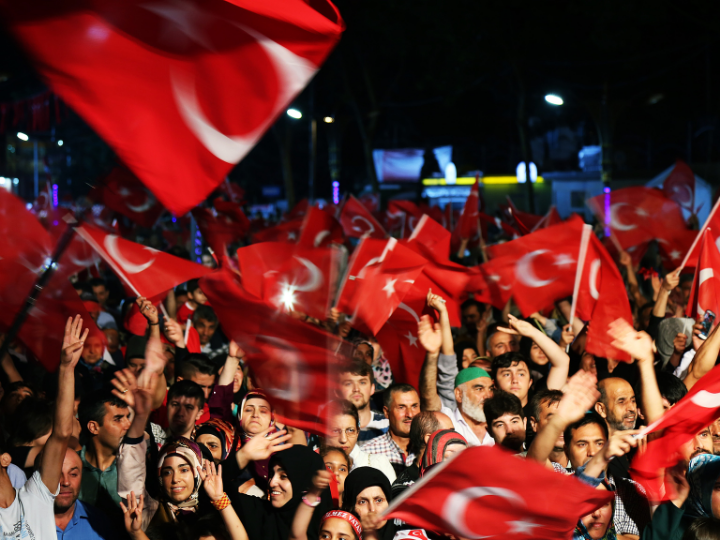by Alexandra Brzozowski
Turkey’s President Recep Tayyip Erdogan’s sudden U-turn on unblocking Sweden’s bid for NATO membership earlier this week came as a pleasant surprise to many.
The unease then came with Ankara having upped the stakes by demanding that the EU revive Turkey’s stalled EU membership bid as a precondition.
Turkey has been an EU candidate since 1999 and started accession talks in 2005, but the process has been effectively frozen since 2018 – with little prospect of continuation – not only over domestic coup attempts and rule of law deterioration but also due to strained relations with its EU neighbour Greece.
Erdogan’s last-minute change of position on NATO came after an eleventh-hour meeting with Swedish Prime Minister Ulf Kristersson and NATO Secretary-General Jens Stoltenberg – and a pre-planned 90-minute meeting with European Council President Charles Michel.
NATO’s memo in the end mentioned vague promises about changing Turkey’s strained relationship with the EU, including Sweden’s pledge to support Ankara’s accession efforts, modernisation of the EU-Turkey Customs Union and visa liberalisation.
The rift between the EU and Turkey has been relatively wide in recent years, but last week indicated that both sides could be warming up to each other, though for different reasons.
Most EU member states have considered Turkey’s EU accession bid dead, but they have not made a point of saying it publicly out of concern that that would further alienate Erdogan and make improvements on key policy areas such as energy cooperation and migration harder.
Brussels seems to have been waiting out the results of May’s Turkish elections while planning to reassess EU-Turkey relations once Greece’s own national elections were done.
Two weeks ago, EU leaders held a first discussion of the bloc’s relations with Turkey at their regular summit and asked the European Commission and EU’s chief diplomat Josep Borrell to come up with a comprehensive report on the “state of play” of EU-Turkey relations “with a view to proceeding in a strategic and forward-looking manner”.
According to EU officials, this report is expected to be ready ahead of the next EU summit in October, with the aim to spell out all issues.
“We expect this to be a 360° view of where Turkey stands in all areas of cooperation with the EU – and we expect it to be blunt because otherwise we just dance around the flag pole,” one EU diplomat said.
EU foreign ministers, meanwhile, are expected to pick up on the issue when they meet for the last time next Thursday (20 July) before the summer break.
Ahead of the talks, the EU’s diplomatic service (EEAS) produced a short memo, seen by EURACTIV, that does not rate Ankara’s chances for its membership bid as very high.
Russia’s war in Ukraine “has raised Turkiye’s geopolitical relevance”, while the EU has “a strategic interest in a stable and secure environment in the Eastern Mediterranean,” the memo states.
While carefully avoiding any commitments, it recognises that “despite policies that have driven Turkiye away from the EU in recent years, Turkiye insists that EU accession is a strategic goal”.
Next to accession prospects, EU foreign ministers are also expected to consider how to “actively contribute to the speedy resumption of Cyprus settlement talks” and how the EU can better address Ankara’s interests.
Beyond stating the obvious with lines on ‘continued engagement’, it remains vague on chances for Ankara to revive its bid.
Despite the EU’s strategic considerations, there seem to be more obstacles than opportunities.
“I don’t think any kind of reopening of the accession process could be realistic right now as for that the core question remains human rights and democratic standards,” MEP Nacho Sanchez Amor (S&D, Spain), member of the European Parliament’s EU-Turkey Joint Parliamentary Committee, told EURACTIV.
“However, the accession process being in that state doesn’t prevent the conversation on other aspects of our relations such as the customs union, the visa liberalisation or holding high-level political dialogues,” Sanchez Amor said.
The dialogues, which have been on ice since the infamous Sofa-gate meeting between Erdogan and EU leaders Charles Michel and Ursula von der Leyen, could be the lowest-hanging fruit for the bloc.
“Bringing Turkey closer to us has always been the aim – before and even more now with the war in Ukraine – as we are neighbours, and we want to have the best possible relations with all our neighbours,” Sanchez Amor said.
“Whether Turkey becomes or not a member of the EU is a different matter (…) there is no shortcut for the accession process,” he added.
Amanda Paul, senior policy analyst in Europe in the World Programme at the European Policy Centre (EPC) told EURACTIV that “there is very little chance of restarting accession talks, particularly given that Turkiye no longer meets the Copenhagen political criteria”.
“Ankara’s approach to the Cyprus problem, namely its insistence on a two-state solution, is also likely to remain an obstacle,” Paul said, adding, however, that this would also require “a change of approach from the Greek Cypriots, who have consistently held a maximalist position to a solution to the Cyprus problem, particularly since they joined the EU”.
The EU admitted Cyprus in 2004 although Turkish troops still control part of the country.
“But given that the Turkish economy is in dire straits, there is likely to be a growing link between foreign and economic policy,” Paul said, adding that steps to modernise the EU-Turkiye Customs Union “seemed more realistic”.
“Given the economic crisis, it is something that Turkiye really wants as the EU is Turkiye’s main economic partner.”
“The EU should not miss this opportunity to regain some leverage on Ankara and initiate negotiations – subject to Turkiye meeting a set of benchmarks,” she added.
*first published in: Euractiv.com




 By: N. Peter Kramer
By: N. Peter Kramer
